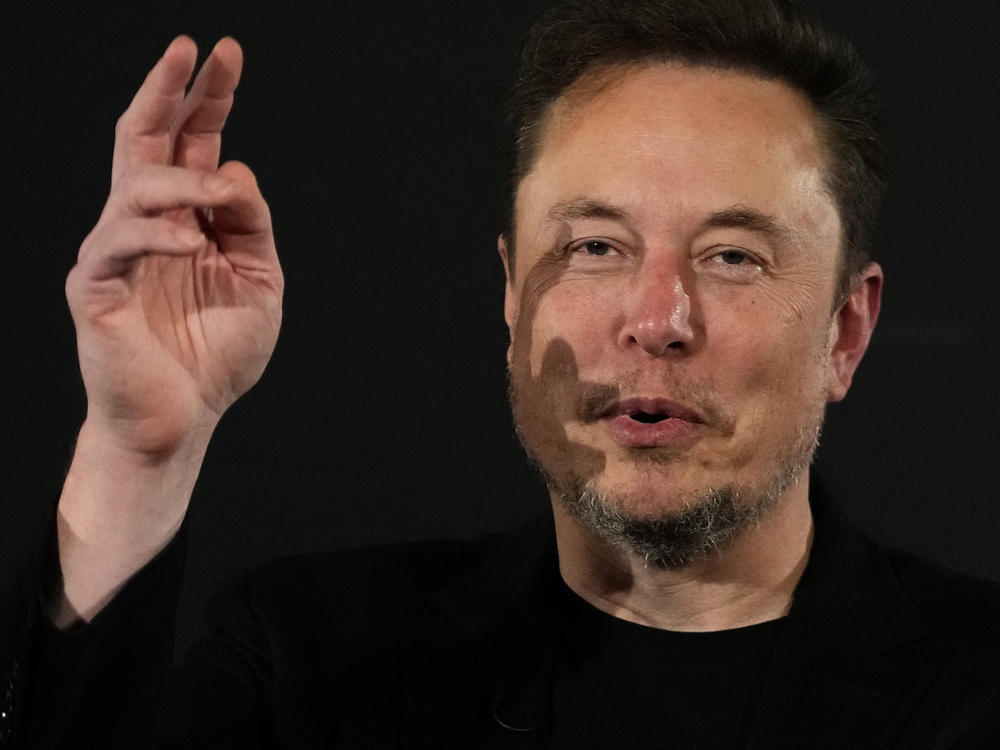Section Branding
Header Content
Disney, Comcast and Apple join advertiser exodus from Elon Musk's X over antisemitism
Primary Content
Updated November 18, 2023 at 11:08 AM ET
Advertisers are leaving the site formerly known as Twitter after a new report found that pro-Nazi content was appearing next to company ads and Musk himself supported a baseless antisemitic conspiracy theory to his 163 million followers.
IBM confirmed on Thursday that it is stopping advertising on X, saying the company has "zero tolerance for hate speech and discrimination."
The European Commission also condemned X's promotion of hate speech, confirming during a press briefing on Friday that it would no longer advertise on any social media platform.
As of Saturday morning, Disney, Comcast NBCUniversal, Warner Bros., Lionsgate, Paramount Global and Apple had all announced they were pulling ads from X, according to multiple news outlets that cited sources at the companies.
NPR reached out to each company to request confirmation. Spokespersons for Disney and Comcast NBCUniversal confirmed the reports, but no other companies had responded by the time of publication.
The advertising exodus comes after the liberal watchdog group Media Matters released a new report this week that found a number of major companies, including Apple, Amazon, Oracle NBCUniversal's Bravo network had advertisements showing up alongside white nationalist posts on the site.
On Saturday morning, Musk tweeted that X planned to file a lawsuit against Media Matters on Monday, accusing the group of wrongfully attacking the company's right to free speech.
Earlier in the week, Musk posted: "You have said the actual truth" in response to a post that claimed Jewish people hold "dialectical hatred" of white people.
The White House was among those who condemned the tweet, with deputy press secretary Andrew Bates calling it an "abhorrent promotion of Antisemitic and racist hate" which "runs against our core values as Americans."
The outcry over hate speech on X comes amid a financially challenging time for the platform, which generates nearly all of its revenue from advertising. Musk has publicly said that U.S. advertising revenue is down 60%, something he blamed on pressure from advocacy organizations, like the Anti-Defamation League.
For months, Musk has attempted to find other ways to make money on the social media platform, including charging for "verified" blue checks in a subscription service, but none of his efforts have gained momentum, just as the company's advertising base appears more rickety than ever.
X's chief executive Linda Yaccarino attempted to contain the fallout and lessen the hit to the company's wallet, writing on the site that X's stance "has always been very clear that discrimination by everyone should STOP across the board," adding that: "There's no place for it anywhere in the world — it's ugly and wrong. Full stop."
Musk tapped Yaccarino, the former head of advertising at NBCUniversial, in large part to help bring back major advertisers to the platform since Musk acquired it last year and unleashed drastic changes. Among Musk's shakeups has been loosening rules around what is allowed to be posted to the site, leading to a surge of hate and conspiracy theories.
"Aside from his own rhetoric, Musk has opened the floodgates to hateful content by reversing bans on anti-Muslim bigots, white nationalists, and antisemites," according to the new report from Media Matters, which also noted that X now pays some antisemitic creators for making posts go viral.
Jewish advocacy groups have said that allowing hate against Jews to spread on X during an escalating war in the Middle East is especially reckless.
"At a time when antisemitism is exploding in America and surging around the world, it is indisputably dangerous to use one's influence to validate and promote antisemitic theories," the Anti-Defamation league's CEO Jonathan Greenblatt wrote on the platform on Thursday.
In September, Musk held a public talk with Israeli Prime Minister Benjamin Netanyahu, who asked Musk to do more to "roll back" hate against Jews on his platform.
In response, Musk said that he was "against attacking any group, doesn't matter who it is," but did not specifically commit to combating antisemitism on X.
Copyright 2023 NPR. To see more, visit https://www.npr.org.
Correction
A previous version of this story said the Media Matters report was released prior to Elon Musk's controversial tweet about Jewish people. It was released after the tweet.

